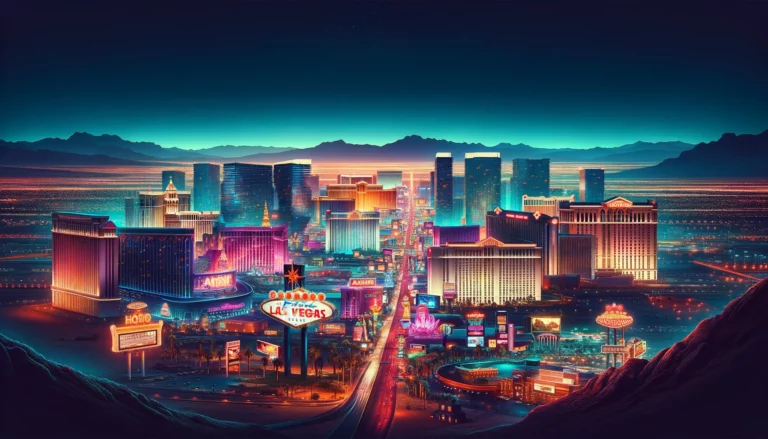Revving Up for the Las Vegas Grand Prix: What It Means for the City of Lights
Introduction
As the sun sets on the Mojave Desert, the neon lights of Las Vegas begin their nightly spectacle, illuminating the cityscape with a glow that beckons millions of visitors each year. Known for its dazzling entertainment and high-stakes gaming, Las Vegas has long secured its place as a global icon of leisure and luxury. But beneath the shimmer lies a city that is fast becoming a mecca for the world’s most prestigious sporting events. On November 18, the city is set to host a new kind of spectacle that combines the thrill of sport with the spectacle of Vegas—The Formula 1 Las Vegas Grand Prix.
Formula 1 racing, the pinnacle of motorsport, is renowned for its high-speed races, cutting-edge technology, and international flair. It’s a sport where the world’s top drivers and constructors push the boundaries of speed and human ingenuity on tracks that span the globe. And now, with its sights set on Las Vegas, F1 is about to make a grand leap into the heart of America’s playground.
This isn’t just any race; it’s poised to be an event that will capture the world’s attention and set new records for viewership and economic impact. With an audience that surpassed 1.5 billion in the 2022 season, F1 is no stranger to the limelight. But as it races down the Las Vegas Strip at speeds topping 200 miles per hour, the stakes are as high as the expectations.
The upcoming Las Vegas Grand Prix symbolizes more than just another race—it’s a testament to the city’s evolution from a gamblers’ haven to a sports and entertainment powerhouse. Critics once doubted that sports could thrive in the desert heat, yet today, Las Vegas stands proud, ready to defy those expectations and prove that it can host events of global significance.
As we look towards the inaugural event, it’s crucial to explore what the Las Vegas Grand Prix means for the city. Will the roar of the engines echo a boom in the economy? How will the influx of visitors reshape the local hospitality scene during what was once a “slower-than-average” period? And beyond the glitz, what will be the Grand Prix’s legacy for the community’s social fabric?
Join us as we delve into the world of Formula 1 and discover the potential for transformation when high-octane racing meets the Entertainment Capital of the World. The Las Vegas Grand Prix is not just a race; it’s a harbinger of change, an event that promises to leave its mark on the city in ways we can only begin to imagine
Key Takeaways
- Historic Economic Impact: The Las Vegas Grand Prix is projected to have a historic economic impact, potentially doubling the economic benefit of the Super Bowl, with long-term implications for the city’s economy through infrastructure improvements, job creation, and increased tax revenues.
- Real Estate and Investment Surge: The event is expected to stimulate the Las Vegas real estate market across The Strip, residential, and commercial sectors, attracting a variety of investors and contributing to a rise in property values.
- Global Attention and Viewership: The Las Vegas race is set to capture global attention with record-breaking viewership, reinforcing the city’s reputation as an entertainment capital and influencing its future as a host for international events.
- Progressive Leadership and Social Impact: The Grand Prix is leading the way in sports event management with significant female representation in its executive team and a commitment to social responsibility, sustainability, and community benefits.
- Tourism and Brand Transformation: The inaugural F1 event will transform a traditionally slower tourism period into a high-demand season, reshaping Las Vegas’s image and offering a template for integrating major sports into urban growth and branding strategies.
History of F1 in America: The Evolution of Stateside Racing
The love affair between Formula 1 and the United States is a saga filled with high-speed drama, legendary racetracks, and a pursuit for a foothold in the land of motorsports diversity. This relationship dates back to the early days of the World Championship and has since evolved into a cornerstone of F1’s global calendar.
The Early Days: Sebring and Riverside
Formula 1 made its official American debut in 1959, with the United States Grand Prix held at the Sebring International Raceway in Florida. It was a race that introduced Americans to the world’s premier form of motorsport, albeit with a modest audience. A year later, the race moved to the Riverside International Raceway in California, but it was clear that F1 was still in its infancy in the U.S. market.
The Watkins Glen Era
The true home of F1 in the United States was found at Watkins Glen International in New York. From 1961 to 1980, “The Glen” hosted what would become one of the most cherished stops on the F1 circuit. It was here that F1 racing grew its American roots, as fans gathered each year to watch the sport’s greatest names battle it out on a classic road course.
The Quest for More Venues
Despite the success at Watkins Glen, F1 sought to expand its American presence. Various other venues were trialed, including Long Beach, Las Vegas, Detroit, Dallas, and Phoenix. Each race brought its own character to the championship, but none managed to achieve permanent fixture status, reflecting a broader struggle to find the right formula for F1’s success in the U.S.
Indianapolis: The Turn of the Century
In 2000, F1 racing returned to prominence in the U.S. with the construction of a road course at the Indianapolis Motor Speedway, the iconic venue known for the Indy 500. The United States Grand Prix at Indianapolis ran until 2007 and saw mixed fortunes – from the infamous 2005 race, where only six cars competed due to tire safety issues, to some of the most attended F1 races in history.
The Austin Revolution
The Circuit of the Americas (COTA) in Austin, Texas, marked a new era when it joined the F1 calendar in 2012. Designed specifically for Formula 1, COTA has been widely praised for its facilities and the exciting racing it promotes. The Austin race quickly became a fan and driver favorite, solidifying the U.S.’s position in the F1 world once more.
Miami Joins the Fray
In 2022, Miami made its grand entrance, further expanding F1’s footprint in the U.S. with the Miami Grand Prix. Set around the Hard Rock Stadium, the event was a spectacle of speed and glamor, aligning with the city’s vibrant culture and passion for sports.
The Future: Las Vegas and Beyond
Looking ahead, F1’s American journey is set to reach new heights with the Las Vegas Grand Prix. With its planned night race along the Strip, F1 taps into the very heart of American entertainment. This move signals a clear intent: Formula 1 is not just racing in America; it’s racing to become a part of America’s fabric, intertwining with the culture, the people, and the bright lights of its most dazzling cities.
The history of F1 in America is a testament to the sport’s perseverance and adaptability. From initial forays into the U.S. market to the current surge in popularity, F1 has navigated the American landscape with the same precision and audacity that its drivers take to the track. With the Las Vegas Grand Prix, the next chapter promises to be as electrifying as the races that have written the past. It’s a future filled with the promise of checkered flags, champagne showers, and a permanent place for F1 in the pantheon of American sports tradition.
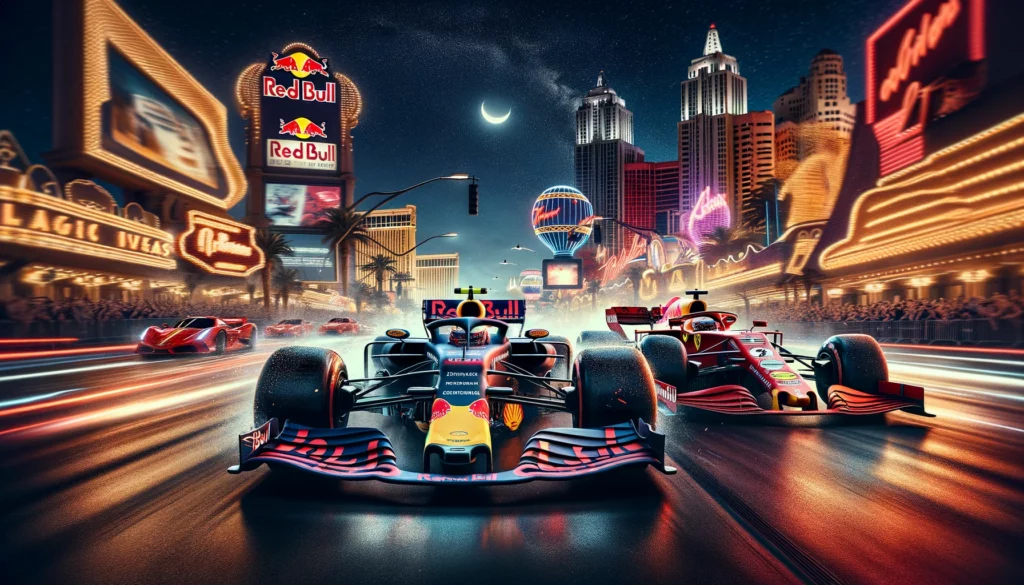
Economic Impact of Sporting Events
Sporting events have emerged as powerful engines driving economic growth, injecting vitality into host cities with immediate and enduring impacts. The surge of visitors drawn by the competitive spectacle boosts local economies through increased patronage of hotels, eateries, and shops, while the events themselves create a bevy of employment opportunities.
Beyond the direct financial infusion, these events gift cities with a heightened international profile, magnifying their allure as travel destinations and paving the way for future tourism.
The ripple effects of hosting major sporting events extend to the very infrastructure of a city. Transport systems are modernized, public spaces are beautified, and sports facilities are upgraded, not just for the games but for the future benefit of the community.
This investment often stimulates further private and public sector spending, fueling economic activities and development projects that might otherwise have remained on the drawing board.
In the long run, the legacy of sporting venues can be multifaceted, serving as continued hubs of activity and tourist attractions, thereby diversifying the city’s economic portfolio and protecting against fluctuations in individual sectors.
Moreover, the successful management and hosting of such events burnish a city’s reputation, attracting a calendar of future events. This cycle of preparation, celebration, and re-investment casts sporting events not just as temporary diversions but as foundational pillars for sustainable urban economic and social development.
Potential Downsides and Challenges
The Risk of Overinvestment
The risk associated with investing in large sporting events is the potential for overbuilding or making investments that do not offer a sustainable return post-event.
Displacement Effect
Local businesses not associated with the event may see a temporary downturn if the event causes regular customers to stay away from the congested area or city during the event period.
Opportunity Costs
Funds allocated to sporting events may lead to missed opportunities elsewhere, especially if the event does not generate the anticipated economic return.
Measuring the True Impact
Economic Impact Studies
To accurately assess the economic impact of sporting events, comprehensive studies are conducted before and after the events, measuring variables such as job creation, GDP contribution, and tax revenue changes.
Beyond the Numbers
The true impact of sporting events also includes intangible benefits such as community pride, international recognition, and the promotion of a healthy lifestyle, which can indirectly contribute to the local economy.
Conclusion: The Balancing Act
Weighing Costs and Benefits
Cities must carefully weigh the costs against the potential economic benefits when bidding for and hosting sporting events. This balance is crucial for ensuring that the event delivers a positive economic legacy.
By examining these elements, cities can better position themselves to maximize the economic potential of hosting large sporting events while mitigating risks and ensuring long-term benefits for the local community.
Las Vegas’s History with Major Events: A Metamorphosis into a Sports and Entertainment Hub
Las Vegas, a city that sprang from the arid Nevada desert, has become synonymous with grandeur and entertainment. Over the years, it has metamorphosed from a gambling oasis into a versatile host for an array of major events, far beyond the baize and the slot machines.
The Entertainment Capital: A Foundation Built on Shows and Conventions
The ascent of Las Vegas as an entertainment capital began with its iconic shows and casinos, but it quickly expanded to include major conventions, such as the Consumer Electronics Show (CES) and the National Association of Broadcasters (NAB). These events have drawn millions from around the globe, turning the city into a crossroads of international business and innovation.
Boxing’s Marquee Matchups
The city’s forte in hosting began to diversify with marquee boxing matchups. The legendary fights of Muhammad Ali, the theatrics of Mike Tyson’s bouts, and the extravagance of Floyd Mayweather encounters turned the city’s rings into theaters where history was penned in punches, drawing eyes and dollars alike.
Rodeo and Beyond: Embracing Diverse Sporting Events
Las Vegas also became home to the National Finals Rodeo (NFR), turning cowboy culture into a high-rolling festivity every December. With the Wrangler jeans came the proof that Las Vegas could wear many hats, hosting events as diverse as the Electric Daisy Carnival (EDC), a pulsating electronic dance music festival that transforms the Las Vegas Motor Speedway into a neon-lit wonderland.
The Rise of Team Sports
The 2017 announcement that the Oakland Raiders NFL team would relocate to Las Vegas and become the Las Vegas Raiders marked a significant turning point. The construction of the state-of-the-art Allegiant Stadium not only provided a home for the team but also a venue for potential Super Bowl games, further cementing the city’s status as a sports hub.
Hockey Hits the Jackpot
The city’s sports scene took another leap forward with the introduction of the Vegas Golden Knights to the NHL in 2017. The team’s success in reaching the Stanley Cup Finals in their inaugural season was a storybook entry into major league sports and proof that Las Vegas had the market and the gusto for homegrown professional sports teams.
Soccer and Basketball Join the Fray
Las Vegas has flirted with major league soccer through various exhibition games and tournaments, showcasing a growing appetite for the sport. In basketball, the city hosts the NBA Summer League, where new draftees and hopefuls make their mark, and has been a recurring topic of NBA expansion discussions.
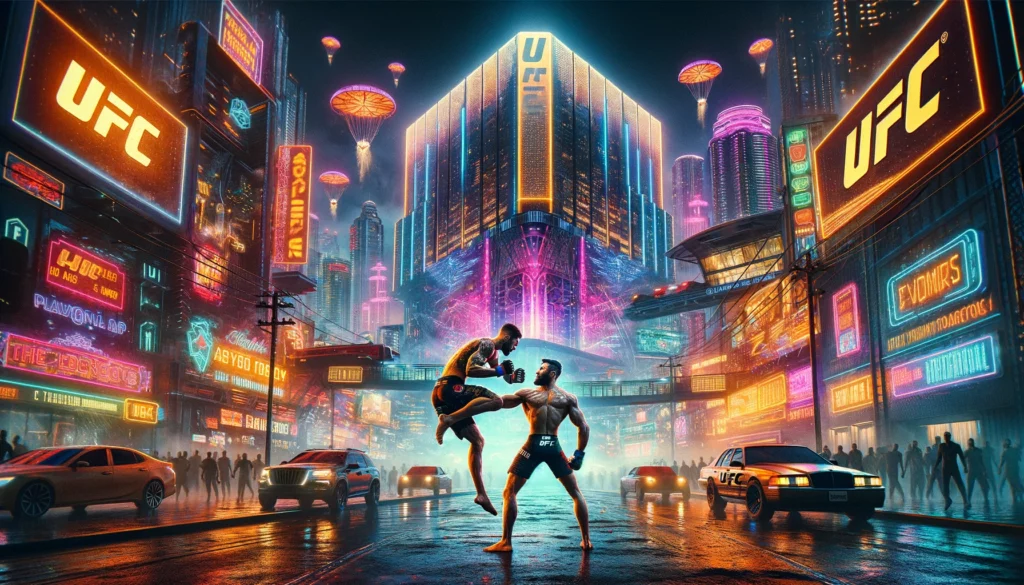
Ultimate Fighting Championship
The Ultimate Fighting Championship (UFC) has also delivered a knockout blow to Las Vegas’s economy, proving itself as more than just an entertainment spectacle—it’s a financial heavyweight. The city, which serves as the UFC’s headquarters and premier event location, reaps significant rewards on fight weekends. These include packed hotels, bustling casinos, and a global media spotlight that shines on the city’s venues and amenities. The UFC’s consistent calendar of events contributes to Las Vegas’s reputation as the fight capital of the world, attracting a diverse audience that extends the economic benefits year-round and solidifies the city’s standing in the sporting world.
Formula 1: Accelerating into a New Era
Now, the city is on the cusp of hosting the Formula 1 Las Vegas Grand Prix, an event that promises to bring the high-octane thrill of motorsports to a city no stranger to speed and spectacle. This event is set not only to showcase the world’s fastest motorsport within the city’s glitzy frame but also to broadcast the luxurious and bold spirit of Las Vegas to a worldwide audience.
Through each of these stages, Las Vegas has proven its unique ability to transform and adapt, to not only entertain but also to innovate and excite. With every dice roll, jackpot win, and now with every revving engine, Las Vegas continues to defy expectations, solidifying its role as a titan of tourism and the ultimate host of major events, one dazzling show at a time.
The Inaugural Las Vegas Grand Prix: High Stakes on the High Speed Circuit
The Arrival of Formula 1 in Las Vegas
In a move that marries the pinnacle of motorsport racing with one of the world’s most iconic entertainment destinations, Formula 1 is set to introduce its latest calendar highlight – the Las Vegas Grand Prix. This event marks a significant milestone as Las Vegas hosts its first-ever Formula 1 race, promising to be a spectacular showcase of speed, technology, and entertainment.
A Race Like No Other
The Las Vegas Grand Prix is not just another addition to the F1 calendar; it’s a statement of ambition from a city that epitomizes grand spectacle and an organization that exemplifies elite racing. With a track that weaves through the heart of the Las Vegas Strip, this race is poised to redefine the concept of a motorsport event, providing an adrenaline rush for attendees and viewers alike.
Economic and Cultural Significance
Boosting the Local Economy
The anticipation surrounding the Las Vegas Grand Prix is immense, with projections indicating a substantial economic impact on the city. Hotels, casinos, and other businesses are expected to see a significant uptick in patronage, while the global broadcast will put the city’s allure on full display.
Spotlight on Las Vegas
Beyond immediate economic injections, the race is an opportunity for Las Vegas to assert itself as a prime location for high-profile international events. It is a chance to showcase the city’s capacity for hosting, logistics, and entertainment on a scale never before associated with Formula 1.
Preparations Underway
Infrastructure and Logistics
Las Vegas is undergoing a transformation to accommodate the race, including extensive roadwork and the construction of necessary facilities. The logistical challenge is monumental, but the city is no stranger to hosting large-scale events that demand world-class infrastructure.
Employment Opportunities
The event is a boon for employment, with thousands of jobs being created to support the race. This will not only benefit those working directly with the Grand Prix but also have a trickle-down effect on various sectors such as retail, hospitality, and services.
The Race’s Impact on Motorsport Culture
Growing the F1 Fanbase
By hosting a Grand Prix, Las Vegas is set to play a pivotal role in expanding the Formula 1 fan base in the United States, a market that has shown growing interest in the sport. The race will serve as a catalyst for new and existing fans to engage with F1 racing in a uniquely Vegas atmosphere.
A New Chapter in F1’s American Story
The Las Vegas Grand Prix represents the latest chapter in Formula 1’s expanding American narrative. With Austin and Miami already on the calendar, Las Vegas adds a new dimension to how the sport can integrate with a city’s identity and offer an unrivaled experience for fans.
The Future of International Events in Las Vegas
Las Vegas as a Global Stage
The Las Vegas Grand Prix is more than just a race; it’s a testament to the city’s ongoing evolution and its ambitions on the global stage. It strengthens the city’s portfolio of international events and sets a precedent for future endeavors in the sporting and entertainment worlds.
Anticipating the Inaugural Event
With the countdown underway, all eyes are on November when the Las Vegas Grand Prix will roar to life. This event isn’t merely about the racing; it’s about the city itself becoming part of the spectacle, with each turn of the track promising to be as thrilling as the spin of a roulette wheel.
In sum, the inaugural Las Vegas Grand Prix is a landmark event that will test the city’s capacity to host a global sporting event and its potential to deliver an economic boost. It’s a moment of convergence where the fast-paced world of F1 meets the high-energy vibe of Las Vegas, creating a spectacle that is set to captivate the world.
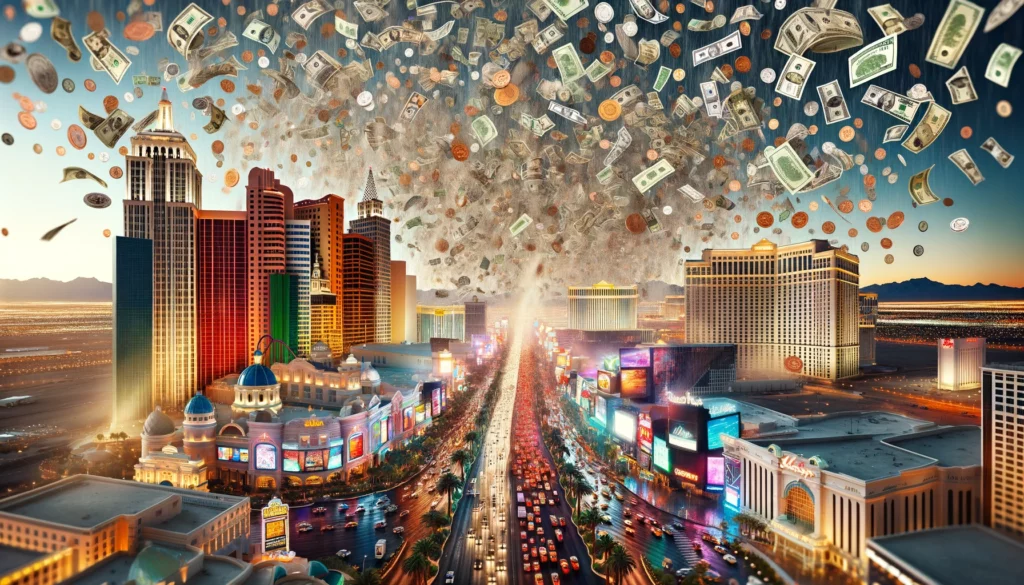
Projected Economic Benefits of the Las Vegas Grand Prix
Las Vegas is gearing up for an influx of visitors, international media attention, and a host of festivities that come with the territory of a Formula 1 event. The projected economic benefits are substantial, extending across various sectors and catalyzing growth in both the short and long term.
Unprecedented Economic Impact
The Las Vegas Grand Prix is expected to deliver an economic impact that could surpass any previous single event held in the city. With projections estimating the impact to be around $1.3 billion, the event is set to become a financial juggernaut. This figure includes direct spending by visitors, operational expenditures of the event itself, and the induced impact of increased economic activity in the region.
A Surge in Visitor Spending
A major chunk of the projected economic windfall comes from visitor spending. With around 100,000 attendees expected each day, the influx of fans, teams, media, and sponsors will significantly benefit hotels, restaurants, retailers, and entertainment venues. The spending doesn’t stop at the race track; it spills over into the city, with attendees exploring what else Vegas has to offer, resulting in an expansive economic ripple effect.
Hospitality and Gaming Industry Windfall
Las Vegas’s hospitality sector is poised for a record-breaking event, with the Grand Prix expected to fill hotels and casinos to capacity. High occupancy rates, coupled with premium pricing, are likely to drive significant revenue. Additionally, the race week may see an “all-time record casino event,” with increased gaming activity contributing to the economic bonanza.
Employment and Wages
The event will create an estimated 7,700 jobs, offering employment opportunities in various fields such as event management, hospitality, security, and transportation. The wages and salaries tied to these jobs will further stimulate the local economy, providing a boost to household incomes and subsequent consumer spending.
Tax Revenue for Public Services
Tax revenue generated by the Grand Prix will be a boon for public finances. Conservative estimates place related tax receipts near $83 million, contributing to state and local government coffers. These funds are earmarked for critical public services and infrastructure, potentially offsetting the cost of hosting and yielding a net positive financial effect for the community.
Infrastructure Investments Paying Off
Investments in infrastructure to support the Grand Prix are expected to pay dividends well beyond the race. Improved roads, upgraded public spaces, and enhanced transit systems will serve the city long after the checkered flag has dropped, supporting future events and bolstering the city’s appeal as a top-tier tourist destination.
Long-term Tourism and Global Branding
The legacy of the Las Vegas Grand Prix will likely extend to sustained increases in tourism. The global exposure from the event will enhance Las Vegas’s branding as an international sports and entertainment hub, potentially attracting new visitors and promoting recurring tourism.
Business Development and Future Growth
The excitement and attention surrounding the Grand Prix may attract new businesses and investors to Las Vegas, looking to capitalize on the city’s growing prominence. This could lead to further diversification of the local economy, reducing its reliance on gaming and broadening its economic base.
Setting Records in Sports Event Hosting
By hosting the most financially significant single event in its history, Las Vegas sets a new benchmark for what cities can achieve with high-profile sporting events. This record-setting potential extends beyond the race itself, positioning Las Vegas as a case study in maximizing the economic benefits of sports tourism.
The projected economic benefits of the Las Vegas Grand Prix highlight the transformative power that a major sporting event can have on a city’s economy. With the right strategy and execution, the race is expected to deliver a performance that matches the speed and spectacle of the event itself.
A High-Octane Comparison: F1 vs. the Super Bowl
The Las Vegas Grand Prix is set to rival the economic impact of the most significant sporting events in the United States, including the Super Bowl. Historically, the Super Bowl has been the titan of economic impact when it comes to single sports events, but F1’s foray into Las Vegas is challenging this supremacy with projections that it could deliver double the financial benefits.
Beating the Odds with F1
While the Super Bowl has been a longstanding highlight in American sports, hosting an estimated economic impact of $600 million for its host cities, the Las Vegas Grand Prix’s projected impact dances around the $1.3 billion mark. This staggering figure is indicative of not just the race’s larger international audience but also its luxurious alignment with Las Vegas’s image as a destination for high rollers and upscale tourists.
Beyond the Game Day
The Super Bowl typically delivers a concentrated economic burst focused around the game weekend, but the Grand Prix stretches the excitement and spending across several days of practice, qualifying rounds, and the main race event. Moreover, F1’s decision to make Las Vegas a recurring host for the Grand Prix promises a sustained economic benefit, unlike the Super Bowl, which rotates locations annually, offering a one-time financial infusion to its host city.
By drawing these comparisons, Las Vegas’s Grand Prix positions itself not just as a competitor but as a new leader in the realm of sports event economics, offering an enduring and amplified economic benefit to the city.
Laying the Groundwork for the Grand Prix
As Las Vegas prepares to host the Grand Prix, the city is bustling with construction activity, making widespread infrastructure improvements to pave the way for the world’s fastest cars. The scope of this work is extensive, with lasting benefits that extend well past the event’s conclusion.
Road Work and Circuit Preparation
The centerpiece of these efforts is the road work required to create a race circuit capable of handling the high speeds and technical demands of Formula 1 racing. Las Vegas Boulevard, famously known as “The Strip,” and surrounding arteries are undergoing a series of upgrades. These enhancements are designed not only to ensure a smooth and competitive racing surface but also to improve the overall quality of roads for future use by residents and visitors alike.
Upgrades with an Eye to the Future
In addition to road work, the city is investing in broader infrastructure improvements, including traffic systems, pedestrian walkways, and public transportation enhancements. These upgrades, though accelerated by the Grand Prix’s requirements, are part of a larger vision to modernize the city’s core facilities and transport links, ensuring that Las Vegas continues to be a world-class destination for all who visit.
With the roar of F1 engines on the horizon, Las Vegas is on track to solidify its reputation as a prime location for major sports events, while also setting new standards for urban infrastructure and planning.
Racing into View: F1’s Global Audience and Las Vegas’s Debut
Formula 1 has long been a titan in global sports viewership, with a fanbase that extends to every corner of the world. As the sport continues to expand its reach, the inaugural Las Vegas Grand Prix is expected to take full advantage of this international spotlight, with projections pointing to record-breaking audience numbers.
Capturing a Global Audience
F1 races were watched by over 1.5 billion viewers in the 2022 season, showcasing the sport’s immense popularity. With Las Vegas’s reputation for glitz and glamour, the Grand Prix here is set to be more than just a race; it’s an entertainment spectacle. The event is uniquely positioned to capture the attention of not only racing enthusiasts but also those attracted to the high-energy Vegas experience.
Breaking Records with Broad Appeal
The Las Vegas Grand Prix’s potential to draw in viewers who exceed the already impressive average of 70 million per race is significant. It leverages the city’s brand as a hub for top-tier entertainment, which could see the race’s viewership surpassing current figures and setting a new standard for what a Grand Prix can deliver, in terms of live audience and television ratings alike.
The race’s strategic scheduling and location, combined with F1’s existing global appeal, position the Las Vegas event to redefine what mass viewership means in the world of sports broadcasting. The city is no stranger to the limelight, and with the high-stakes drama of F1, it’s ready to shine even brighter on the world stage.
Steering Forward: Women in the Driver’s Seat of the Las Vegas Grand Prix
The leadership landscape of the Formula 1 Las Vegas Grand Prix is marked by a refreshing and progressive change, with women taking on key executive roles in a traditionally male-dominated sport. This shift not only signifies a broader change within the industry but also sets a precedent for future events.
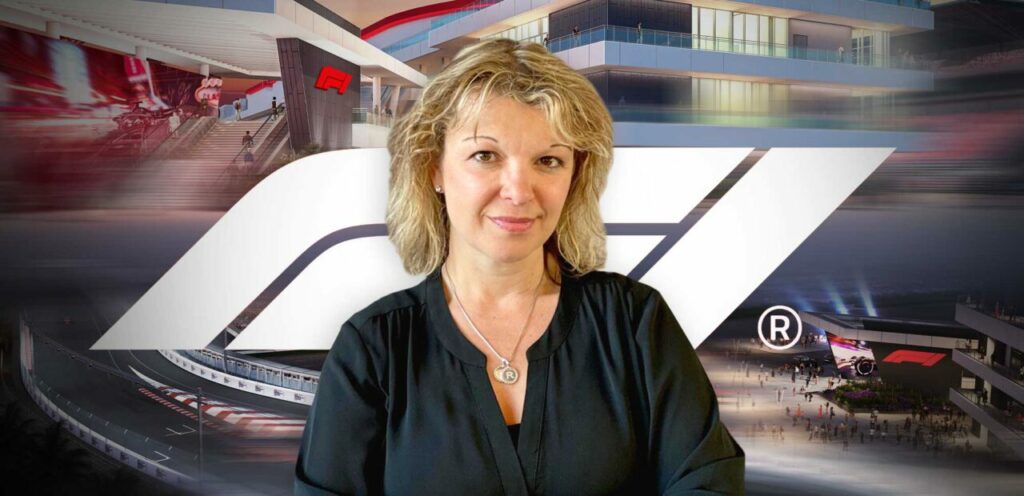
Pioneering Leadership
At the helm of the Las Vegas Grand Prix are two notable leaders: Renee Wilm, the Chief Executive Officer, and Emily Prazer, the Chief Commercial Officer. Their appointments to these top positions underscore a growing trend in sports management, where the inclusion of women in leadership roles is becoming increasingly common. Wilm and Prazer’s roles are critical in overseeing the race’s operations, marketing, and community engagement efforts, demonstrating the impact of diverse leadership on the global stage.
Driving Change Beyond the Track
The influence of these leaders goes beyond the operational aspects of the race. They are instrumental in shaping the race’s brand and ensuring that it resonates with a wide audience. By fostering a culture of inclusivity and representation, they also help to inspire future generations of women to pursue careers in sports management and leadership.
The presence of women in such high-profile positions within the F1 Las Vegas Grand Prix is a significant stride toward gender equality in sports. It’s a testament to the evolving dynamics of leadership and the positive direction that the motorsport industry is heading. With the world watching, the success of the Las Vegas Grand Prix could become a catalyst for change in how women’s contributions to sports are valued and showcased.
Shifting Gears: The Enduring Legacy of the Las Vegas Grand Prix
The arrival of the Formula 1 Las Vegas Grand Prix is more than just a fleeting weekend of excitement; it’s an event that promises to leave a lasting impact on the city’s economic and cultural landscape. The long-term effects are expected to reverberate through various sectors, reinforcing Las Vegas’s status as a premier destination for global events.
Economic Revitalization and Diversification
The economic imprint of the Grand Prix will likely extend far beyond the race itself, as infrastructure improvements, increased employment, and heightened global visibility could stimulate ongoing growth and diversification in Las Vegas’s economy. The annual nature of the race ensures a recurring benefit, potentially smoothing out the city’s tourism revenue throughout the year and mitigating the traditional highs and lows associated with seasonal travel.
Branding “The Entertainment Capital of the World”
The Grand Prix solidifies Las Vegas’s brand as “The Entertainment Capital of the World,” potentially attracting new investments and ventures in entertainment, technology, and sports. This branding exercise may also open doors for the city to host other high-profile international sporting events, conferences, and cultural festivals, reinforcing its global appeal.
Las Vegas’s successful hosting of the Grand Prix could prove to be a model for other cities, illustrating the vast potential of integrating a world-class sporting event into the fabric of a city known for its entertainment prowess. The race is set to mark Las Vegas not just as a city of lights but as a beacon of progressive urban planning and international sports hosting.
The Las Vegas Grand Prix: A New Race for Real Estate
The staging of the Formula 1 Las Vegas Grand Prix is expected to have a significant impact on real estate within the city, with implications varying across different markets and investor interests. Here’s how the event could influence real estate prices and investment patterns:
The Strip: High-Value Hospitality Real Estate
The Strip, already the crown jewel of Las Vegas’s real estate, could see an appreciation in value due to heightened demand for short-term rentals and hospitality services. The annual influx of F1 tourists will require more upscale lodging options, potentially driving up the prices for properties and land in this prime location. The event could also spur the development of new hotels, serviced apartments, and luxury retail spaces, thereby attracting real estate investments from global hospitality brands looking to capitalize on the Grand Prix’s draw.
Residential Markets: A Surge in Demand
Residential areas in Las Vegas could experience a new wave of interest, particularly in neighborhoods within a convenient distance of the Grand Prix activities. The expectation of increased rental demand during the race season may attract Airbnb investors and those interested in short-term rental properties. Moreover, the enhanced global profile of Las Vegas due to the Grand Prix might entice corporate leaders and professionals to consider relocating, seeking the lifestyle and opportunities that come with a growing economic hub. This influx could result in a steady rise in residential real estate prices and a more vibrant housing market.
Commercial Markets: Expanding Beyond the Strip
The commercial real estate market in Las Vegas is poised for growth beyond the vicinity of The Strip, driven by the need for event-related services and facilities. Areas that can host ancillary events, corporate functions, and provide space for the teams and media covering the Grand Prix may see increased commercial interest. This effect can lead to a rise in rental rates and property values in commercial districts as diverse businesses seek to establish a presence near a global sporting venue.
Attracting Diverse Investors
The Las Vegas Grand Prix could be a magnet for a wide range of investors. For Airbnb investors, the consistent annual event promises a regular stream of visitors and a potentially lucrative rental market. For corporate leaders and businesses, the race’s international attention could make Las Vegas an attractive location for corporate expansion or relocation, offering tax advantages and a high-profile business environment.
Moreover, the infrastructure improvements and the prestige associated with the event may draw investors looking for long-term growth opportunities. With the city’s profile raised, Las Vegas could attract investment in sectors like technology and clean energy, which often follow major economic developments.
In summary, the Las Vegas Grand Prix is set to be more than just a temporary boost for the city’s economy—it could be a starting point for sustained growth in various real estate markets, attracting a broad spectrum of investment and interest. As Las Vegas revs up for the Grand Prix, its real estate market is preparing for a race of its own, with the potential for high returns on investment and a new chapter of economic vibrancy.
Hot Takeaways
- Will the Las Vegas Grand Prix set a new standard for economic success in sports event hosting?
- How will the real estate market respond to the annual influx of Formula 1 fans and investors?
- Can Las Vegas reinvent itself as not just a gambling paradise but a global sports and entertainment hub?
- In what ways will the leadership of women in high-profile roles shape the future of motorsports events?
- Beyond the immediate excitement, how will the Grand Prix’s emphasis on sustainability influence other major events in Las Vegas?
- Will the success of the Grand Prix lead to Las Vegas becoming a preferred location for corporate relocations and expansions?
- How might the Las Vegas Grand Prix change the city’s tourism landscape during traditionally slower periods?
Conclusion
In wrapping up our exploration of the Formula 1 Las Vegas Grand Prix, we look ahead to an event that stands as much more than a series of races. It’s a multifaceted phenomenon poised to revitalize Las Vegas’s economy, transform its real estate landscape, and bolster its standing on the global stage. The Las Vegas Grand Prix is not just a testament to the city’s capacity for hosting world-class events but also a beacon of growth, innovation, and inclusive leadership.
As Las Vegas gears up to welcome the high-speed thrills of Formula 1, the city is simultaneously steering towards a future bright with possibility. The anticipation building around the Grand Prix is a microcosm of the excitement that innovation and progress can generate. With the roar of engines on the horizon, Las Vegas stands ready to showcase its dynamism, resilience, and ability to not only meet but exceed expectations. The stakes are high, the potential for reward even higher, and all eyes will be on Las Vegas to deliver an event that could redefine the economic impact and cultural enrichment that major sporting events bring to a city.
The Formula 1 Las Vegas Grand Prix, therefore, is more than just a race weekend—it’s a pivotal point on the timeline of Las Vegas’s storied history. It is a moment that encapsulates the essence of the city: daring, vibrant, and ever-evolving. With every lap, Las Vegas is racing into a future where the city is known not only for its neon lights but also for its bright prospects as a hub of international acclaim.
About the Author: Federico Calderon
Federico Calderon is not your average real estate broker. As the proud owner of Grand Prix Realty, he’s been at the forefront of the Las Vegas real estate market since 2005, boasting a comprehensive career that encompasses mortgage lending, property management, and investment consultation. Federico’s forte lies in his dual expertise in both the high-octane world of real estate and the adrenaline-fueled passion for bodybuilding.
A savvy real estate investor himself, Federico knows the ins and outs of flipping homes, having turned many a fixer-upper into profitable ventures. His robust experience has been instrumental in guiding fellow investors through the labyrinth of property investment, helping them to not only meet but also exceed their financial goals. His dedication to clients’ success is mirrored in his commitment to his own physical fitness as a bodybuilder, where discipline and perseverance are the cornerstones of achievement.
When the glow of the Vegas lights fade, Federico finds his second home in Medellín, Colombia, embracing the city’s vibrant culture and nightlife. It’s here that he recharges, finding the perfect balance between work and play. His time in Medellín is spent absorbing new cultures, celebrating life, and connecting with people from all walks of life, which enriches his perspective both personally and professionally.
Federico’s dynamic approach to life and business makes him more than just a broker—he’s a catalyst for those looking to create wealth and live out their dreams through real estate investment. With Grand Prix Realty, he’s not just selling homes; he’s crafting pathways to success and inviting others to join him on the ride of a lifetime.
Accelerate Your Dreams
Ready to shift your investment dreams into high gear? Connect with Grand Prix Realty today and let us help you accelerate towards your real estate goals. Whether you’re looking to flip your first property, expand your investment portfolio, or secure your future with long-term property management, Federico Calderon and his team bring the expertise, dedication, and personalized attention you need to cross the finish line.
Investing in property is more than a transaction; it’s a strategic move towards a wealthier, more secure future. At Grand Prix Realty, we understand the stakes. That’s why we treat every client’s dream with the utmost precision and care, just like Federico approaches his bodybuilding and business — with discipline, knowledge, and a relentless drive for excellence.
So, if you’re ready to power through the real estate market with a champion by your side, reach out to Federico at Grand Prix Realty. Whether in Las Vegas or Medellín, it’s time to party in the winner’s circle with your new investment property. Accelerate your dreams with us — because with Grand Prix Realty, you’re always in pole position.
References:
Renee Wilm LinkedIn Profile: https://www.linkedin.com/in/renee-wilm-21a01537/


